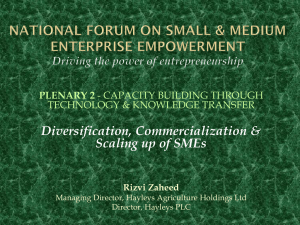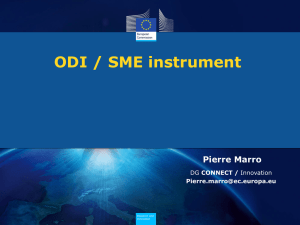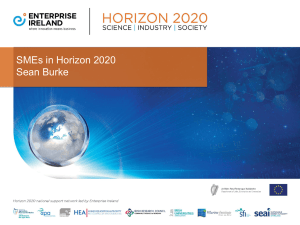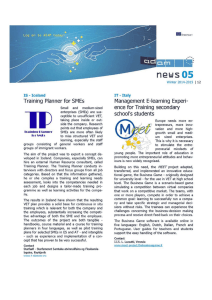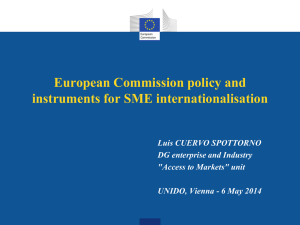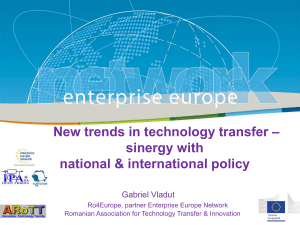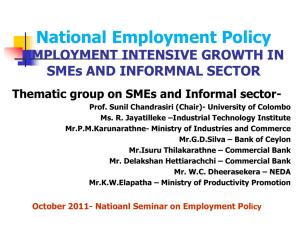FP7 presentation
advertisement
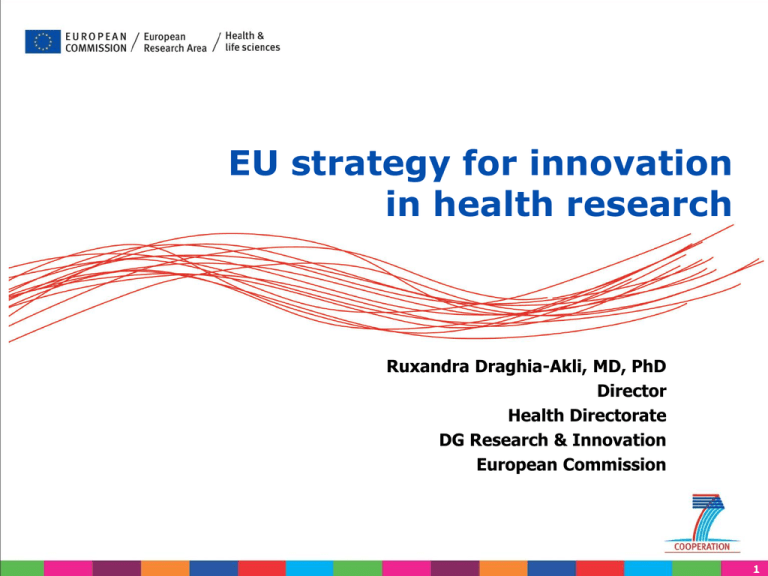
EU strategy for innovation in health research Ruxandra Draghia-Akli, MD, PhD Director Health Directorate DG Research & Innovation European Commission 1 What can FP7 Health do? State of play (Oct. 2011) 2007-2011: ● 13.0% of EU contribution for SMEs ● 13.6% of participants are SMEs ● 462/693 projects (67%) with at least one SME in consortium ● 49 projects (7.0%) coordinated by SMEs 2 Health Theme strategy to encourage SME participations ● 2007 & 2008: 3 SME topics on the FP6 SME call model 11% of EU contribution to SMEs ● 2009 & 2010: SME ‘suitable topics’ ~10% of EU contribution to SMEs ● 2011: SME-targeted topics: € 111 million to SMEs (out of €144m) 1/3 budget ‘X% of EU contribution to SMEs’ as an eligibility criteria and qualitative approach: ‘Leading role’ for SMEs ● 2012: SME-targeted topics + Pilot initiative for SMEs (INNO-2) 14 SME / industry targeted topics ½ budget; 50% of research topics targeted to SMEs (with min. funding for SMEs: >15%, >30% or >50%) all topics are 2-stages; 6 page proposal in the 1st stage 3 Strong impact: doubling in EU funding going to SMEs ~20% of EU funding going to SMEs 144 150 2011 2012 ~11% of EU funding going to SMEs 70 66 2007 2008 60 2009 70 2010 Conservative estimate; could reach €200m 4 Health Theme strategy to encourage SME participations Efforts should be maintained in WP 2013 • to meet the 15% target for SME participation (not only quantitatively, but also qualitatively • to mainstream SME participation (as partners and as project leaders) To support innovation policy 5 Supporting SME participation Fit for Health (complemented by SM BioPower, now finished): • Increase SME participation in Health proposals • Support SMEs during negotiation & projects lifetime • Valorisation of results Kappa Health (now finished): • Survey on success factors in FPs participation (see clips) • Valorisation of results (training + coaching) Support for Innovation WP 2012 topics (under evaluation): • • Technology/knowledge transfer support-network IPR/Knowledge transfer trainings for IPR management, business plan, company launch … Commission survey on impact assessment & valorisation of results 6 SMEs: Reasons to join EU health projects 100% 18% 90% 13% 10% 24% 80% 40% 46% 40% 19% 50% 70% 20% 5 - Very Important 4 3 2 1 0 - Not relevant 26% 75% 60% 26% 17% 23% 50% 20% 31% 40% 22% 13% 29% 21% 15% 16% 30% 10% 14% 14% 20% 14% 10% 5% 3% 3% 0% 8% 8% 8% 5% 8% 12% 17% 18% 16% 11% 16% 9% 2% Integration in a EU Access to Large Scale or netw ork m ultidisciplinary scope that cannot academ ic be achieved at expertise National / institution level 08/04/2015 10% Funding not available in your country Access to special Links to Industrial resources and infrastructures Access to other expertise Source: Impact assessment questionnaire survey (2011) 7 Outcomes from participation (in FP6 & FP7 Health) 60% 50% *5 choices possible 57% 46% 41% Academic SMEs 41% 40% 39% 40% 34% 30% 34% 33% 27% 25% 26% 23% 20% 20% 18% 17% 12% 10% 0% Networking and / or coordination of science Publications Significant in "high expension impact" beyond state journals of the art New or improved products New / development of companies, new jobs New resources Contribution Clear benefit Free access to to patients to important international data research initiatives New or improved protocols Patents Training programmes Other important outputs Source: Impact assessment questionnaire survey (2011) 8 Outlook for 2013 9 Outlook for SMEs in Europe Impact of economic crises ● European Biopharmaceutical Enterprise / Alcimed study (2009): 20% of Europe’s small biopharmaceutical companies at risk of bankruptcy. Risk of loss of 20,000 high-skill, high-value jobs and a permanent damage to Europe’s research capacities. ● Europabio survey (2010): 86% of national associations consider that the main funding gap is at the later stage of product development 57% of national associations linked the funding gap to proof of concept stage ● DG R&I, Health conference (2010): Main conclusions: EU should help address the 'valley of death' by financing proof-ofconcept schemes similar to small business innovation research (SBIR) in the US, eventually with small early funding for proof of concept, followed by the second phase project funding. 10 Evolution of private equity funds raised in Europe Source: EVCA/PEREP_Analytics 11 Technology offer SME questionnaire (July- Sept. 2011) ● All FP6 and FP7 health SMEs (1,236) contacted ● ~1,000 SMEs received the questionnaire ● 106 replied (10%) ● 60-70% have developed / are developing promising technologies and are seeking: Licensing opportunities Technical cooperation Joint venture agreement Manufacturing agreement Commercial agreement 12 Feedback from SMEs • “This project allowed our company to enter a commercial space which it may have had difficulty in doing if funding had to be raised through private equity.” • “We have the opportunity to benefit from both patients and the scientific community.” • “The EU funding has enabled our company to be in a position where the raising of significant capital has been made easier through being able to demonstrate clear capability in this area.” • “It allowed the company to expand its service offer, raise awareness about its activity among the pharmaceutical industry and accelerate the internal product development.” • “Being very young in the market this is a very important opportunity. It gave us access to knowledge and innovative technologies and processes. And the possibility to establish important networks for our business.” 13 SME Strategy in 2013 work programme Commission proposal: • • ~20 SME / industry targeted topics (min. 15%, 30% or 50%) Special topic on translation of promising FP projects results into innovative products/services 14 Case: European Biomedical Technologies sector ● Key sector for European competitiveness ● ● 500,000 jobs EU 18,000 Companies 80% of them are SMEs Very innovative sector Short Product lifecycle (~ 18 months) But dispersed due to broad range of technologies 15 Activities at EU level -> R&I Funding of sector Medical Technologies Mainly: ● Health theme: - FP7 so far: 54 projects funded with a budget of 252M€ 9 of the projects are coordinated by SMEs and 43 projects have more than 2 SME as participants - FP6 - an estimated contribution of ~100M€ Additionally: ● NMP theme ● ICT programme ● CIP 16 Biomedical Technologies: Cutting edge Project Example ● LIFEVALVE: Living autologous heart valves for minimally invasive implantable procedures Hi-tech + highly interdisciplinary project Combination of tissue engng. approach with strong clinical component i.e. minimally invasive surgery (and first clinical trials) Coordinator: Simon P. Hoerstrup, UNIV. Zuerich 8 partners, thereof 3 SMEs XELTIS (CH), worldwide leader for tissue engineered cardiovascular implants. PFM AG (DE), specialised in medical technology products in the fields of pathology/histology, OP/anaesthesia, infusion therapy and interventional technologies. QTIS/E BV (NL), focuses on development of tissue engineering applications and enabling technologies. 17 Last Call FP7 ●Regenerative Medicine Topic 1.4-2: Tools, technologies and devices for application in regenerative medicine. (>30% for SMEs) Topic well covered; 76 proposals submitted, 7 funded, 4 led by SME/IND and in total nearly 50% of budget to SMEs. Innovaliv aims to provide the EU healthcare system with a renewable and reliable GMP source of functional clinical-grade hepatocytes generated from EU hES lines. Biomagscar propose to use a biodegradable magnetised stent to deliver a novel biological therapy offering regenerative medicine solutions to the coronary artery vessel wall. Bio-comet is a bioreactor with automated, controlled, reproducible and GMP compliant operation will be developed for the manufacture of engineered tissues, instrumental to facilitate the broad utilization and commercialisation of tissue grafts as therapeutic solutions. 18 Impact of EU Research&Innovation funding activities ● EU competitiveness - Strengthening / creation of SMEs - Filing / licensing of patents - Creation of jobs ● Improvement of Public Health Development of technologies for better diagnosis and improved treatment Bringing novel technologies faster to market Special added value in context of ageing population 19 Potential contribution to EIP on Active and Healthy Ageing ● Novel medical devices ● HTA (cooperation, new approaches) ● Joint Programming (Neuro) ● Best practices (clinical) ● Gathering of key stakeholders -> Context: Europe 2020 strategy 20



